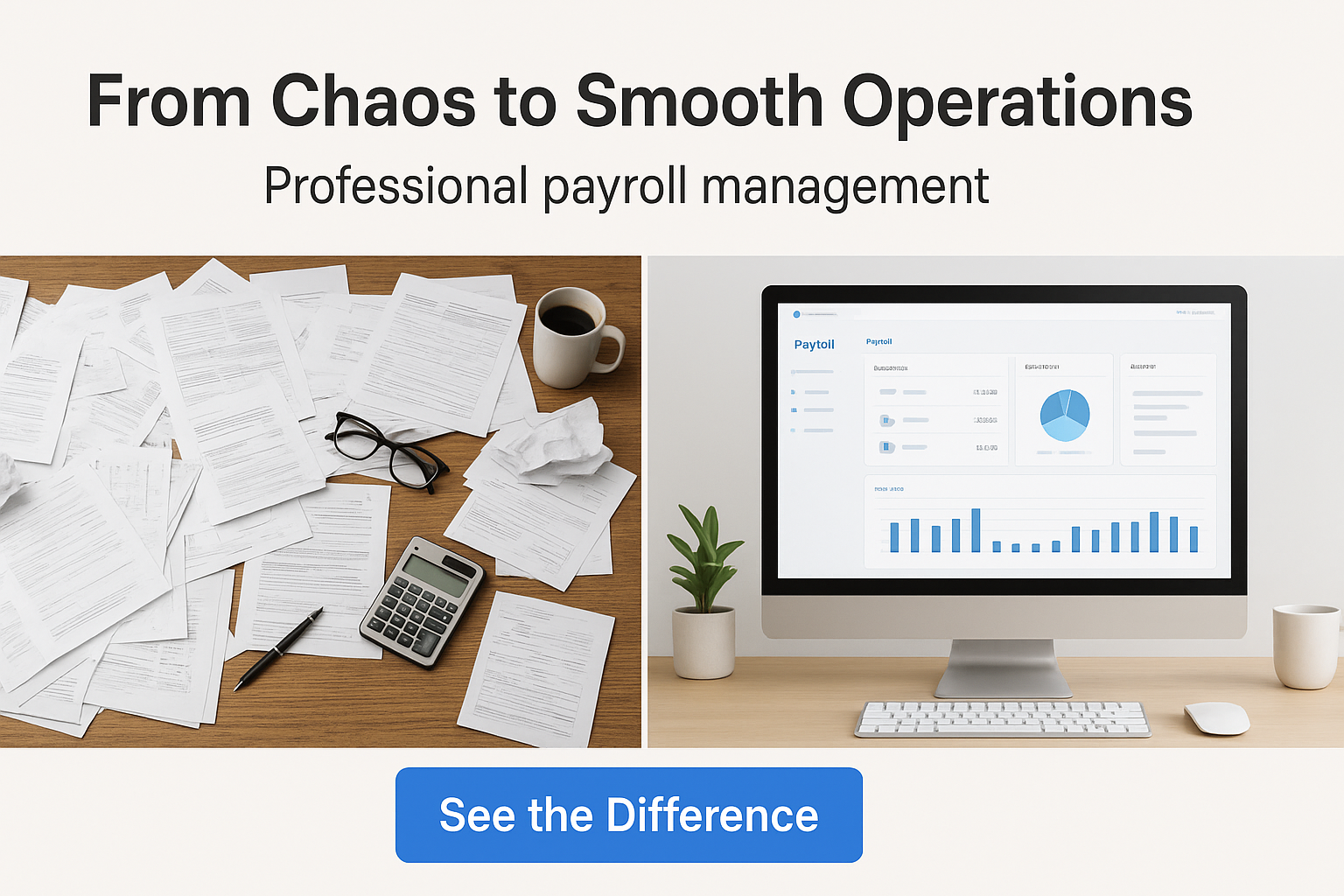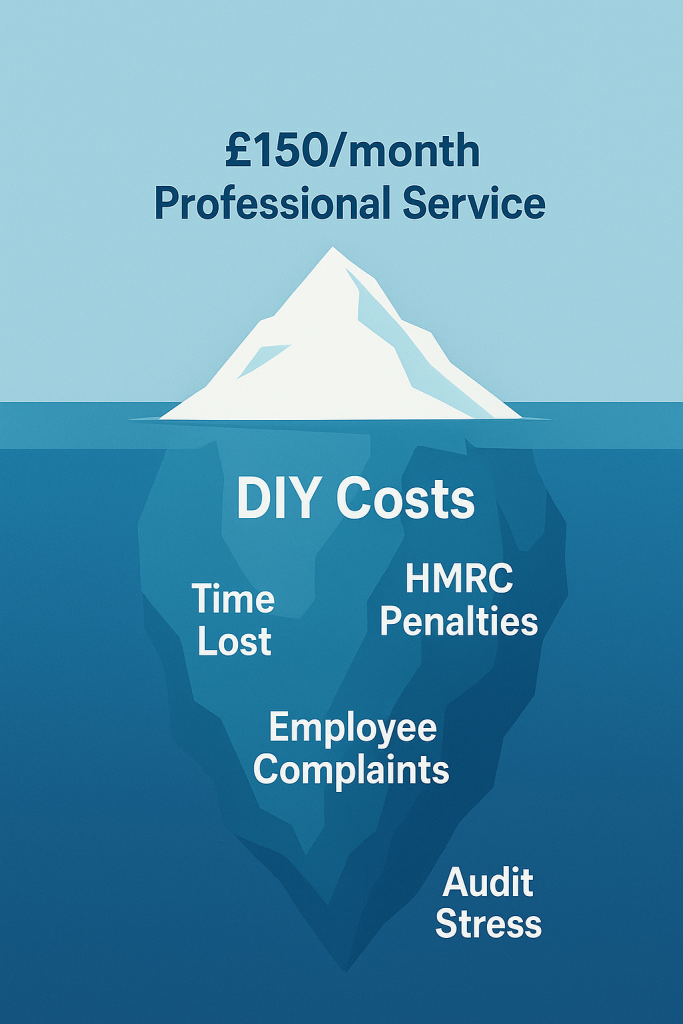
Running a business in London feels a bit like juggling flaming torches while riding a unicycle—exciting, but one wrong move and everything comes crashing down. And nowhere is this more apparent than when it comes to payroll. Miss a payment, botch the tax calculations, or fail to comply with HMRC regulations, and suddenly you’re dealing with angry employees, hefty fines, and the kind of administrative nightmare that makes root canal surgery look appealing.
I’ve watched countless business owners transform from confident entrepreneurs into stressed-out insomniacs the moment they realise their payroll system has gone rogue. It’s not just about cutting cheques anymore (does anyone even use cheques these days?). Modern payroll is a complex beast involving auto-enrolment pensions, Real Time Information submissions, statutory payments, and a maze of employment law that changes more frequently than London weather.
The truth is, London payroll services have become less of a luxury and more of a survival tool for businesses that want to focus on what they actually do best—whether that’s selling artisanal coffee, developing groundbreaking software, or whatever brilliant idea brought them to the capital in the first place.
The Hidden Complexity Behind Every Pay Slip
Most business owners underestimate payroll complexity until they’re knee-deep in PAYE calculations at 2 AM, questioning their life choices. What seems like simple arithmetic—employee hours multiplied by hourly rate—quickly morphs into a mathematical labyrinth involving National Insurance thresholds, pension contributions, student loan deductions, and the occasional court order for child maintenance.
Consider this: a single employee earning £35,000 annually requires calculations for basic pay, emergency tax codes, Class 1 National Insurance (both employee and employer contributions) How to Use Employment Allowance in 2025/26 by Hiring a Worker on a Small Salary, auto-enrolment pension contributions (currently 8% total—3% employer minimum contribution and 5% employee contribution Pensions auto enrolment: information for employers | Low Incomes Tax Reform Group), potential student loan repayments, and any benefits in kind. Multiply this by your entire workforce, factor in seasonal workers, part-time staff, and directors with different tax arrangements, and you’ve got yourself a full-time job that nobody actually wants.
Real Time Information (RTI) submissions compound this complexity. HMRC expects payroll information submitted on or before each pay date—not after, not when convenient, but precisely when they demand it. Late submissions trigger automatic penalties starting at £100 per month for small employers, escalating quickly for larger businesses.
Then there’s auto-enrolment compliance, which catches many employers off-guard. Every three years, you must re-enrol eligible workers who’ve opted out Pensions auto enrolment: information for employers | Low Incomes Tax Reform Group, maintain detailed records, and navigate the labyrinthine rules around qualifying earnings and postponement. The Pensions Regulator doesn’t mess about—compliance failures result in fines that can reach £10,000 daily for large employers.

When DIY Payroll Goes Spectacularly Wrong
Sarah owns a fashionable cafe in Shoreditch and believed that she was capable of maintaining payroll herself utilising simple software. Six months down the line she found that she was miscalculating holiday entitlements, underpaying National Insurance contributions and that she had been totally neglecting her auto enrolment duties. The cleanup forced her to pay penalties and back-payments that amounted to 8,000 pounds- a sum that can pay professional London payroll services in two years.
Her story isn’t unique. DIY payroll disasters follow predictable patterns:
- Statutory payment miscalculations: Sick pay, maternity pay, and paternity pay calculations involve specific qualifying criteria and changing rates. Get these wrong, and employees suffer while employers face tribunal claims.
- Complexity of holiday pay: Working Time Regulations demand that the calculation of holiday pay (including overtime and commission) be made using an average of the earnings in the past 52 weeks. Such nuances are commonly lost on basic software.
- HMRC noncompliance: Making a wrong P11D filing to HMRC through to failing to pay CIS deductions to construction industry workers, the administrative nightmare increases exponentially by the complexity of the business.
Professional payroll services in London help avoid such risks by keeping up to date with regulatory requirements expertise. They’ve seen every scenario, handled every edge case, and built systems that adapt to regulatory changes automatically.
The True Cost of Payroll Errors
Let’s talk numbers, because that’s what keeps business owners awake at night. HMRC penalties for late PAYE submissions start small but escalate ruthlessly:
| Number of Employees | 1-9 Late Submissions | 10+ Late Submissions | Monthly Penalty |
| 1-9 | £100 | £200 | £300 |
| 10-49 | £200 | £300 | £400 |
| 50-249 | £300 | £400 | £500 |
| 250+ | £400 | £500 | £600 |
Beyond direct penalties, payroll errors create ripple effects that damage businesses in unexpected ways. Employee trust erodes when pay is late or incorrect. High-value staff consider leaving when they can’t rely on consistent, accurate compensation. Time spent firefighting payroll disasters is time not spent growing the business.
Auto-enrolment penalties follow their own brutal logic, with The Pensions Regulator issuing escalating penalty notices for non-compliance. Fixed penalties start at £400, but compliance notices can trigger daily penalties reaching thousands of pounds for persistent failures.

What Professional London Payroll Services Actually Do
London payroll services are an extension of your business, and can do everything including simple pay calculations to complicated regulatory compliance. However, the most outstanding providers take it a step further and they provide strategic knowledge that enhances organizational business activities.
- Comprehensive pay processing covers obvious elements like salary calculations, tax deductions, and National Insurance contributions, plus subtle requirements like attachment of earnings orders, student loan deductions, and benefits in kind calculations. Professional services maintain current knowledge of threshold changes, rate updates, and regulatory modifications that catch DIY processors off-guard.
- Auto-enrolment management removes the administrative burden entirely. These are in the form of, initial employee testing, staging date conformance, continuous monitoring of eligibility changes, re-enrolment cycles, and rigorous record-keeping that pass the regulatory muster. In 2025/26, the auto-enrolment earnings threshold is still set at 10,000 and the range of qualifying earnings between 6,240 and 50,270 GOV.UK/MoneyHelper.
- HMRC compliances include Real Time Information filings, year end returns (P60s, P11Ds), Construction Industry Scheme management of the affected businesses and contact with HMRC regarding questions or disagreements. Professional penetrates in direct relation with HMRC; problems addressed by professional are likely to be solved faster than by business owners who have to go through a typical helpline.
- Self-service portals among employees are a great step in payroll delivery. Rather than mornings, broken down payslips, holiday entitlement and pension contribution queries, employees are able to log into confidential online portals with full tailored payment histories, P60 downloaders and updated holiday balances.
Technology That Actually Works
Modern London payroll services use advanced technology that has made manual systems obsolete, so choosing the right provider requires understanding what happens behind the digital interface.
Cloud-based systems offer clear benefits: automatic backups, remote access, and instant updates. However, providers vary dramatically in their capabilities. Premium services integrate seamlessly with popular accounting programs (Xero, QuickBooks, Sage) and HR and time-recording systems, creating smooth data flows that eliminate manual entry errors.
API integrations may sound technical, but they deliver practical benefits. When your payroll software connects directly to your accounting system, it automatically posts all wage costs, pension contributions, and HMRC payments to the correct nominal codes. This eliminates manual entry, removes reconciliation headaches, and prevents month-end panic over whether the numbers balance.
Mobile applications extend these capabilities beyond the office. Employees can access payslips, book holidays, and update personal details through secure mobile platforms. Managers can authorize overtime, view team costs, and access real-time reporting from anywhere in London—or anywhere in the world.
However, technology alone isn’t enough. The most effective London payroll services combine advanced technology with skilled professionals. Automated systems handle calculations and HMRC submissions, while experienced staff manage exceptions, resolve complex queries, and provide strategic advice.
Navigating London’s Unique Employment Landscape
London businesses face specific challenges that generic payroll providers often miss. The capital’s employment market involves unique considerations that require specialist knowledge.
- Higher living costs mean London weighting allowances, travel allowances, and benefits There are increased living expenses in London, which translate into London weighting allowances, travel allowances and benefits packages at variance with the national averages. London payroll services know about these local differences and will design your payments to optimise tax but ensure employee satisfaction.
- Diversity employment issues such as overseas staff whose visa regulations are complicated, different NI entitlements and possible double taxation agreements needs to be taken into consideration. Another aspect of processing payroll of EU nationals after Brexit is increased compliance requirements that no one sees coming on experienced payroll providers.
- The London business is like a number of businesses, where seasonality impacts the establishment through influx of tourists to hospitality outlet and escalation during Christmas time retail centers. The intricacies of casual workers, zero-hours contracts and seasonal pension auto-enrolment are addressed by the professional services.
- Construction Industry Scheme (CIS) covers many London businesses which perform construction services such as main contractors and subcontractors who are specialists. ZCIS operations encompass unique registration, verification and payment summations that are very different to normal PAYE processing.
To the small businesses juggling these complexities, players such as Ask Accountant, can deliver comprehensive services to align payroll anchored within an expert business advice platform that can also support tax planning and business planning needs.
The Hidden Benefits of Professional Payroll Management
Beyond obvious advantages like accuracy and compliance, professional London payroll services deliver unexpected benefits that transform business operations in subtle but significant ways.
- Management reporting provides valuable insights that busy business owners often overlook during daily operations. Professional services can produce detailed analytics covering wage cost trends, overtime patterns, department comparisons, and forecasting. These reports enable strategic decision-making. For example, you might discover that sales staff consistently bill 15 percent over budget each month. Or you could identify that overtime costs predictably spike every December. Armed with this knowledge, you can take proactive measures instead of simply reacting to crises.
- Payroll smoothness means an increase in employee satisfaction that can be measured. Staff trust increases when they receive accurate, timely payments with clear, detailed payslips. Self-service portals reduce HR administrative burden while giving employees control over their information and immediate access to payment histories.
- Audit preparation becomes painless with professional payroll records. Whether facing HMRC enquiries, preparing for company audits, or dealing with employment tribunal claims, comprehensive payroll records maintained to professional standards provide robust documentation that protects business interests.
- Strategic planning support emerges naturally from accurate payroll data. Professional services help model the costs of salary increases, additional recruitment, or benefit changes, enabling informed decision-making rather than guesswork.
Cost Considerations: Investment vs. Expense
Many business owners initially balk at professional payroll costs, viewing them as unnecessary overhead. This perspective changes quickly when they calculate the true cost of DIY payroll management.
Consider a typical London business with 15 employees. Processing payroll internally requires approximately 6-8 hours monthly for basic calculations, submissions, and employee queries. Add year-end procedures, auto-enrolment management, and statutory payment calculations, and the time investment reaches 15-20 hours monthly for someone with payroll expertise.
At London employment rates, this represents £600-£1,000 monthly in direct costs. This figure excludes the opportunity cost of senior management time spent on payroll rather than business development.
Professional London payroll services typically cost £150-£400 monthly for similar-sized businesses. This represents significant savings even before factoring in error prevention and compliance assurance.
| Business Size | DIY Monthly Cost | Professional Service Cost | Annual Saving |
| 1-5 employees | £300-500 | £80-150 | £2,640-4,200 |
| 6-15 employees | £600-1,000 | £150-400 | £5,400-7,200 |
| 16-30 employees | £1,000-1,800 | £300-700 | £8,400-13,200 |
| 31+ employees | £1,800+ | £500-1,200 | £15,600+ |
These calculations assume competent internal processing. Factor in potential penalties, errors, and the learning curve for regulatory changes, and professional services deliver even greater value.

Choosing the Right London Payroll Service Provider
Not all payroll providers are created equal, and London businesses need services that understand local requirements while delivering consistent, reliable performance.
- Regulatory expertise forms the foundation of quality service. Providers should demonstrate current knowledge of HMRC requirements, auto-enrolment regulations, and employment law changes. Ask potential providers about recent regulatory updates and how they communicate changes to clients—quality providers proactively inform clients about upcoming changes rather than reacting after problems arise.
- Technology integration capabilities determine operational efficiency. Modern businesses require payroll services that integrate seamlessly with existing accounting software, HR systems, and banking arrangements. Providers offering limited integration options create additional administrative work rather than reducing it.
- Support accessibility varies dramatically between providers. Some offer comprehensive telephone support during extended hours, while others rely primarily on email communication with delayed responses. Consider your business needs—do you require immediate support for urgent issues, or are planned communications sufficient?
- Scalability ensures services grow with your business. Providers should handle increasing employee numbers, additional complexity (international workers, multiple pension schemes, complex bonus structures), and evolving reporting requirements without requiring complete system changes.
- Professional qualifications indicate service quality and regulatory knowledge. Look for providers with qualified staff holding relevant certifications (CIPP, AAT, ACCA) and demonstrated experience with London businesses facing similar challenges.
Red Flags to Avoid
Certain warning signs indicate payroll providers that may create more problems than they solve.
- Unrealistic pricing often indicates hidden costs or substandard service. Providers who offer payroll services significantly below market rates typically compensate by charging extra for “add-ons” like P60 production, HMRC correspondence, or software access—services that should come standard.”
- Limited communication about regulatory changes suggests providers lack current expertise or proper systems for client updates. Quality providers communicate proactively about threshold changes, rate updates, and compliance requirements.
- Inflexible systems that can’t accommodate business-specific requirements (unusual pay cycles, complex bonus structures, multiple pension schemes) indicate providers focused on volume rather than service quality.
- Poor references or reluctance to provide client testimonials raises obvious concerns. Established providers willingly share references from similar businesses, demonstrating track record and client satisfaction.
Making the Transition Smooth
Switching to professional London payroll services requires careful planning to ensure seamless transition without disrupting employee payments or HMRC compliance.
- Data migration involves transferring employee records, year-to-date figures, tax codes, and pension information to new systems. Quality providers handle this process comprehensively, verifying accuracy and ensuring continuity of records for year-end processing.
- HMRC notification requirements include updating PAYE scheme details and ensuring new providers have appropriate authorisation for RTI submissions and correspondence. Professional providers guide clients through these administrative requirements.
- Employee communication helps staff understand changes to payroll processing, new self-service facilities, and any alterations to payment timing or payslip format. Clear communication prevents confusion and demonstrates professional management of business operations.
- Banking arrangements may require updates to direct debit mandates, BACS approval processes, or authorisation procedures. Professional providers coordinate with banks to ensure smooth payment processing from the first payroll.
Future-Proofing Your Payroll Strategy
Employment regulations evolve constantly, driven by political changes, economic conditions, and social developments. Professional London payroll services provide businesses with regulatory protection that adapts to changing requirements without requiring internal expertise updates.
From April 2025, National Insurance rates for employers increased from 13.8% to 15%, while the secondary threshold dropped from £9,100 to £5,000 Gravita/Khoob Accountancy. This represents a significant cost increase for all employers, making accurate calculations even more critical.
Off-payroll working regulations (IR35) continue evolving, affecting how businesses engage contractors and consultants. Professional providers maintain current knowledge of complex determination processes and ensure compliance with changing requirements.
Pension auto-enrolment thresholds and contribution rates require ongoing monitoring and system updates. The Employment Allowance increased to £10,500 for 2025/26 How to Use Employment Allowance in 2025/26 by Hiring a Worker on a Small Salary, providing some relief for qualifying employers.
Making Tax Digital initiatives will eventually extend to payroll processing, requiring businesses to maintain digital records and submit information through approved software. Professional providers invest in compliant systems, protecting clients from future compliance requirements.
Minimum wage laws are ratcheting up in complexity and it is not uncommon to have a separate wage rate applicable to apprentices, those under the age of 25 and a host of industry specific rates. Professional providers keep up to date and automatically use the correct rates as it varies.
Business entrepreneurs who flourish in the competitive business environment in London concentrate their energies on the activities they are good at but leave complicated administrative considerations to the experts.
Professional payroll services in London enable this focus by providing compliant, reliable, and efficient payroll processing that scales with business growth.
Companies such as Ask Accountant help businesses that want to outsource their payroll burden and engage in strategic business planning. They ensure payroll aligns with tax positions and business goals. Their London-based team understands local business needs while delivering the personal attention that makes complex compliance manageable.
Professional payroll extends beyond processing payments—it creates strong business foundations that enable sustainable growth in one of the world’s most demanding business environments. It is not a question of whether you can afford professional London payroll services, but whether you can afford to carry on without taking up these services.
Frequently Asked Questions
What are the prices of London payroll services?
The price depends on the number of employees and complexity, with a typical cost of small business (1-5 staff) averaging at 80-150 per month; whereas larger companies cost 500+. The vast majority of providers bill on a per-employee basis or will provide tiered billing.
Is auto-enrolment compliance available with payroll services?
Yes, professional providers can handle end-to-end auto-enrolment compliance corporation such as initial assessment, continuous monitoring, re-enrolment regimes and regulatory reporting. This frees employers of a lot of administrative stress.
How do we respond in case HMRC question our payroll?
Good quality payroll providers will deal with HMRC correspondence themselves, with all the details properly documented and to deal with any tax authority on customers behalf. Such business-related professional representation frequently produces solutions to problems in a more effective manner than business owners themselves operating as query managers.







